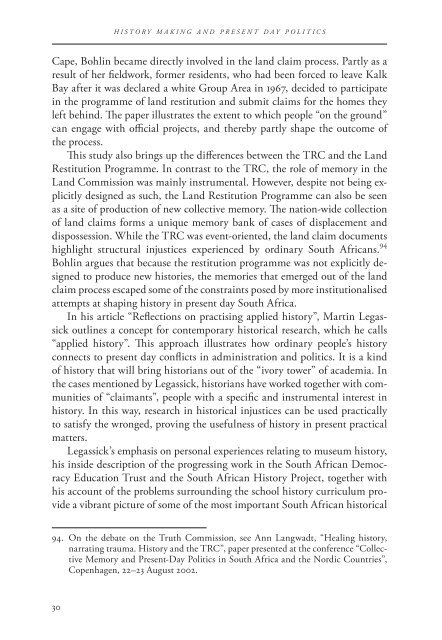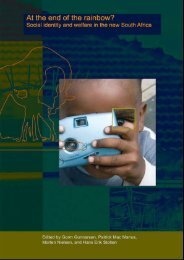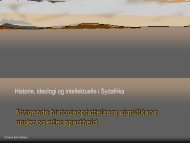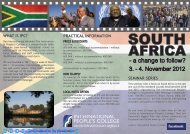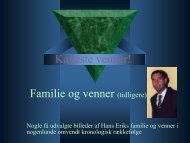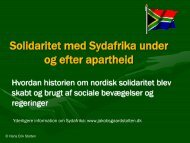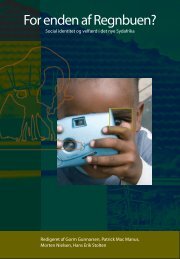History Making and Present Day Politics - Stolten's African Studies ...
History Making and Present Day Politics - Stolten's African Studies ...
History Making and Present Day Politics - Stolten's African Studies ...
You also want an ePaper? Increase the reach of your titles
YUMPU automatically turns print PDFs into web optimized ePapers that Google loves.
h i s t o r y m a k i n g a n d p r e s e n t d a y p o l i t i c s<br />
Cape, Bohlin became directly involved in the l<strong>and</strong> claim process. Partly as a<br />
result of her fieldwork, former residents, who had been forced to leave Kalk<br />
Bay after it was declared a white Group Area in 1967, decided to participate<br />
in the programme of l<strong>and</strong> restitution <strong>and</strong> submit claims for the homes they<br />
left behind. The paper illustrates the extent to which people “on the ground”<br />
can engage with official projects, <strong>and</strong> thereby partly shape the outcome of<br />
the process.<br />
This study also brings up the differences between the TRC <strong>and</strong> the L<strong>and</strong><br />
Restitution Programme. In contrast to the TRC, the role of memory in the<br />
L<strong>and</strong> Commission was mainly instrumental. However, despite not being explicitly<br />
designed as such, the L<strong>and</strong> Restitution Programme can also be seen<br />
as a site of production of new collective memory. The nation-wide collection<br />
of l<strong>and</strong> claims forms a unique memory bank of cases of displacement <strong>and</strong><br />
dispossession. While the TRC was event-oriented, the l<strong>and</strong> claim documents<br />
highlight structural injustices experienced by ordinary South <strong>African</strong>s. 94<br />
Bohlin argues that because the restitution programme was not explicitly designed<br />
to produce new histories, the memories that emerged out of the l<strong>and</strong><br />
claim process escaped some of the constraints posed by more institutionalised<br />
attempts at shaping history in present day South Africa.<br />
In his article “Reflections on practising applied history”, Martin Legassick<br />
outlines a concept for contemporary historical research, which he calls<br />
“applied history”. This approach illustrates how ordinary people’s history<br />
connects to present day conflicts in administration <strong>and</strong> politics. It is a kind<br />
of history that will bring historians out of the “ivory tower” of academia. In<br />
the cases mentioned by Legassick, historians have worked together with communities<br />
of “claimants”, people with a specific <strong>and</strong> instrumental interest in<br />
history. In this way, research in historical injustices can be used practically<br />
to satisfy the wronged, proving the usefulness of history in present practical<br />
matters.<br />
Legassick’s emphasis on personal experiences relating to museum history,<br />
his inside description of the progressing work in the South <strong>African</strong> Democracy<br />
Education Trust <strong>and</strong> the South <strong>African</strong> <strong>History</strong> Project, together with<br />
his account of the problems surrounding the school history curriculum provide<br />
a vibrant picture of some of the most important South <strong>African</strong> historical<br />
94. On the debate on the Truth Commission, see Ann Langwadt, “Healing history,<br />
narrating trauma. <strong>History</strong> <strong>and</strong> the TRC”, paper presented at the conference “Collective<br />
Memory <strong>and</strong> <strong>Present</strong>-<strong>Day</strong> <strong>Politics</strong> in South Africa <strong>and</strong> the Nordic Countries”,<br />
Copenhagen, 22–23 August 2002.<br />
30


